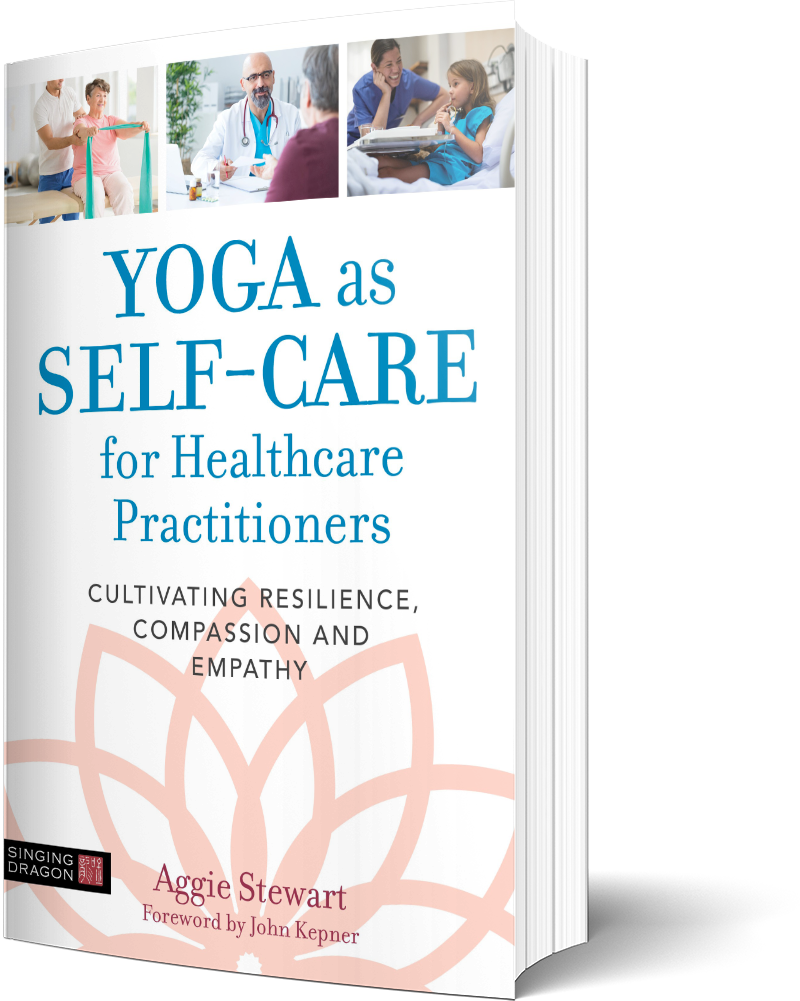Healthcare practitioners do some of the most difficult work of caring for others, too often at the expense of our own health, wellness, and well-being. While we’re encouraged to practice self-care, it’s often framed as another “to-do” in a personal and professional life chock full of to-do’s. And when time becomes short and the press of others’ needs becomes great, the best of intentions to take care of our self can fall by the wayside.
It doesn’t have to be this way.
Reframing Self-Care
Publishes on August 21, 2019. Click here to pre-order.
Geared specifically to the needs of healthcare practitioners, Yoga as a Self-Care Practice for Healthcare Practitioners reframes self-care as an integrated aspect of our lifestyle that flows from a relationship with our self that is positive, kind, loving, and based in self-compassion. It offers an accessible guide to developing a customized, personal yoga practice to help manage stress and reach one's full potential that fits seamlessly into our day.

Download a Free Chapter
In this book, you'll learn:
- The principle Yoga teachings, including the ancient yogis’ holistic understanding of the multi-dimensional human system – similar to the western medical biopsychosocial model of health – and the foundational tools, techniques, and methodology of yoga practice.
- How to create a personal yoga practice, including formal practices and micro-practices, that is customized to your individual needs, interests, schedule, and goals.
- How the frequency of practice is more important than the length of practice.
- How a consistent personal practice can help us to develop greater awareness of our stress-response patterns and transform them to support sustained resilience and access to our innate well of empathy and compassion.
Who this Book is For
- Students in training to become healthcare practitioners
- Healthcare practitioners in professional practice
- Curriculum developers in colleges and universities that educate and train healthcare practitioners
- Wellness educators in healthcare delivery settings
- Yoga teachers who want to help healthcare practitioners to develop a personal yoga practice
What People Have Said

John Kepner, Executive Director, International
Association of Yoga Therapists
“Yoga as a Self-Care Practice for Healthcare Practitioners will challenge your ideas about self-care, stress and the role of the mind, and yoga—in the best of ways. Aggie reframes both self-care and stress and shows why personal yoga practice offers a potent way to safeguard your health and wellness while doing the important work of caring for the health and wellness of others. She presents the depth and breadth of yoga teachings in an accessible and relatable way, and encourages you to think broadly about what yoga practice can be and how it can become an integral and integrated part of your busiest and most challenging days.”

Matthew J. Taylor, PT, PhD, C-IAYT, past-president of IAYT, leader in integrative rehabilitation, and author of Yoga Therapy as a Creative Response to Pain
“In Yoga as Self-Care for Healthcare Practitioners, Stewart has created a resource that is timely and accessible for her intended audience. Moreover, this guide is much needed in the yoga community as well given the weight of teaching and offering support to a rapidly expanding sphere of students with their own health challenges. Buy it, read it, and most of all, gift yourself with the practice you design for you in the process!”

Audrey Stillerman, MD, ABFM, ABIHM, ABOIM, Associate Director of Medical Affairs, University of Illinois at Chicago Office of Community Engagement and Co-Founder of The Center for Collaborative Study of Trauma, Health Equity, and Neurobiology
“Health care experts agree that practitioner well-being is one of the four pillars of a high value health care system. How can we achieve this when the burdens of clinicians' own traumatic experiences, chronic exposure to the suffering of others, and our broken system itself yield increasing rates of clinician impairment, compassion fatigue, burnout, and most tragically, suicide?
Using her deep knowledge and experience of the ancient healing system of yoga, Aggie Stewart draws a clear and practical road map for developing a personal yoga practice to support clinician health, healing, and well-being. In Yoga as Self-Care for Healthcare Practitioners, Stewart blends her understanding of this timeless, holistic practice with contemporary biological and social science, making it relevant and accessible to individual healthcare practitioners and easy for healthcare organizations to integrate into existing programs and structures to guide personal and institutional transformation. She offers prevention and treatment strategies designed to restore and maintain brain-body regulation and balance as well as right relationship to self and others, essential conditions for health and healing for both practitioners and patients. Yoga as Self-care for Healthcare Practitioners is a welcome tool to help us build the high value health care system our nation deserves.”

Kristi L. Kirschner, MD, University of Illinois College of Medicine
"In Yoga as Self-Care for Healthcare Practitioners, Aggie Stewart has unpacked in clear, succinct prose the healing foundations for the practice of yoga. As a latecomer to the practice, I now find yoga indispensable to my daily life and well-being. I hope young health professionals—particularly those in training—heed her advice to begin this powerful self-care practice early on. I know I wish I had!"

Susan Tebb, Ph.D., M.S.W., C-IAYT, RYT-500, Professor Emerita, School of Social Work, College for Public Health and Social Justice, Saint Louis University
“I applaud Aggie for the way she interweaves yoga practices and wisdom, which I find to be a helpful approach for those who might view self-care as something one might do only when time permits. Aggie’s approach to yoga practice as self-care will support readers to make the needed mindset changes to see self-care as self-compassion and as a necessity rather than as something frivolous. This approach to self-care can help us be the best “tool” possible for those we serve in our helping professions. The assessments Aggie shares are an invaluable resource for clinicians to use as a starting point to help themselves and their clients find ways to be self-compassionate through yoga practice.”
